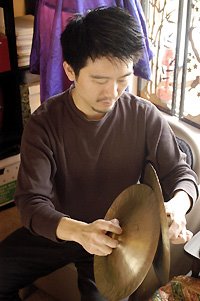
My first love led to my disintegration. I played and played, visiting homes where the piano had become a table for overgrown plants. I played and played and found myself a bit too intimate with a parlor instrument at three o'clock in the morning. I played and played until certain keys stuck and the notes stopped sounding. I had fallen in love with an antiquated machine; an old-fashioned coffin that I desperately tried to warm with the soft fur of music. I was no longer integral to society. I had become engaged in necrophilia with an inanimate relic.
As an instrument of class, the piano signifies dominance. This is symbolized on the keyboard by ebony-black keys that are separate and hover tentatively behind ivory-white keys, which side-by-side form a phalanx. When the piano was in its infancy, the keys were various color combinations, but now the black keys are always a pentatonic scale. "I'm playing Chinese!" I used to exclaim as an eight-year-old, running my fingers along the black keys. The momentary look of horror on my mom's face receded when the potential benefit of having a classical musician for a son began to outweigh the cartoonish distillation of Chinese music into five pitches. For hours, I commanded the interaction of those keys, as other boys command toy soldiers. In the process, I became a brainwashed despot sitting by myself in a practice room in a hall filled with practice rooms of other musicians sitting by themselves.
 When he was 8...
When he was 8...Glenn Gould tried to escape by humming beyond the regulated pitches. Stockhausen held the damper pedal down until the overtone-clouded harmonies provided a momentary release. John Cage threw screws and bolts into the guts of the beast. George Maciunas had Nam June Paik hammer nails into every key of the piano until the instrument was destroyed. Sonic Youth revived the Maciunas Piano Piece #13, in 1999, to no avail. The shiny-black-trophy-hearse piano lives on in the concert hall heart of every music school.
For composers, the piano is deadly. Music is about voices within bodies that sing about the human condition. The piano has taken vocalists away from learning how to sing within an oral tradition. The piano has taken bodies and forced them to sit. The piano has taken its role as a tool of music and become a tool for dictators. For music to regain its agency and creativity, composers must unchain themselves from the piano and reintegrate the two primary building blocks of composing music: drum and voice.
Drumming energizes the body from the outside with hands or feet that produce percussive beats that propel dramatic action. Singing arises from the inside of the body and soars towards the heavens. Together, drumming and vocalizing contain seeds that when thrown into cultural cracks grow into the intertwining narratives of music.
While the piano can play a melody over a rhythmic pattern, the results fall into gestures that are constrained by tuning and history. The initial impulse to compose must come from the infinite complexities of drumming and vocalizing rather than from the limited mechanics of the piano. Later, piano may be added as an instrument of the music, but never before—otherwise the music becomes an instrument of the piano.
It is easy to begin a new work by sitting at a keyboard and playing and playing and playing. While this machine easily produces sound, beware; once it dictates the works being created, then the essence and potential of imagination in musical storytelling is lost. As an artist who lives on the edges, I will always reify the piano, but as a composer I realize that drumming and vocalizing are the essential tools of my craft.
Hmm... so, what do u think? Is piano that scary??




2 comments:
Wonderful and informative web site. I used information from that site its great. Toyota canry check engine light valspar driveway paint cindy phillips state farm insurance hoschton 2c ga cadillac srx audio conferencing Ambien sleep htm l Chat lesbianas espaa Car dog seat covers Photo club large tits Sport utility vehicle accident statistics http://www.valium-online-0.info/Valium-xenical.html C.o.d accepted for purchasing butalbital Bookcases rockford concrete driveway ideas
Excellent, love it! »
Post a Comment